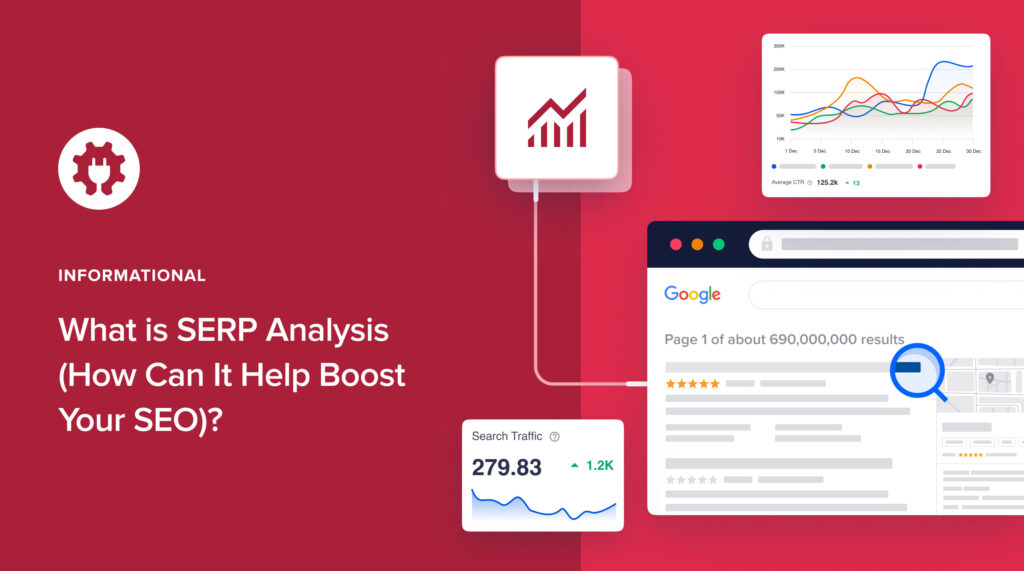What is SERP analysis, and how does it impact your SEO?
If you’re running your own SEO campaigns, then you’ve probably run across the term SERP analysis as you study SEO. You may also be wondering why it’s important and how you can use it to boost your SEO.
In this article, we’ll explain SERP analysis and show you how it can help you to use it to boost your SEO.
In This Article
What is SERP Analysis?
SERP analysis is the practice of studying search engine results pages (SERPs) to discover top-ranking content and what makes it perform so well. It also involves identifying the types of content, metadata, and other factors helping your competitors rank well. Doing this helps you know what to do to outrank the top-performing content.
SERP analysis also involves studying SERP features and identifying the best opportunities to rank for them. Some of the most popular SERP features include:
- Featured Snippets
- Rich Snippets
- Knowledge Panels
- People Also Ask (PAA) Box
- Top Stories
Check out our guide on SERPs for more information on what SERPs are and tips on getting your content to the top.
Benefits of SERP Analysis
SERP analysis has many benefits that positively impact your SEO. Chief among those benefits include:
- Improves keyword research: SERP analysis can help you identify new keywords or phrases you could have missed in your keyword research phase. And because it helps you discover keywords that rank high, you’re better positioned to rank faster.
- Helps with content optimization: Analyzing the content that’s ranking highly for your target keyword is a great way to identify ways to improve your content’s quality and relevance.
- Helps refine your competitor analysis: SERP analysis helps you identify your competitors and their performance in search engines for your target keyword. This is an essential aspect of competitor analysis that can help give you insights into how to improve your rankings.
- Identify featured snippet opportunities: SERP analysis can help you identify whether your target keyword has a featured snippet. If not, it also helps you identify opportunities for landing the featured snippet for your target keyword.
Overall, SERP analysis helps you understand the search landscape so you can optimize your content accordingly. It’s an invaluable part of SEO that can give you an edge over the competition.
How to Use SERP Analysis to Boost Your Rankings
Now that you know what SERP analysis is and its importance, let’s quickly dive into how to use this powerful process to boost your SEO.
1. Get A Clear Picture of Your Metrics
One of the first places to start when conducting a SERP analysis is getting a clear picture of your performance on SERPs. This is easy with All In One SEO (AIOSEO).
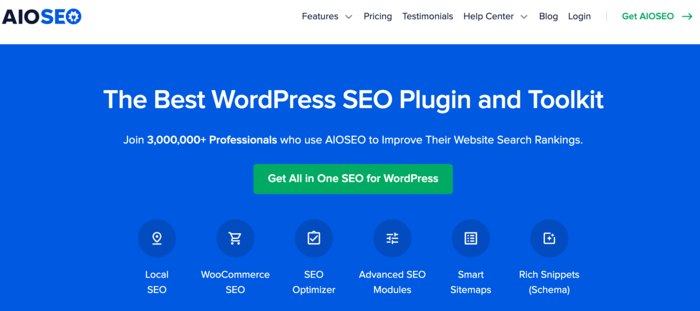
AIOSEO is the best WordPress SEO plugin on the market and has been downloaded over 100 million times. Millions of savvy website owners and marketers trust the plugin to help them dominate SERPs and drive relevant site traffic. This is because the plugin has many powerful SEO features and modules to help you optimize your website for search engines and users.
One of the most beloved features in AIOSEO is the brand-new Search Statistics module, our Google Search Console integration.
This revolutionary module makes tracking your SEO data from your WordPress dashboard easy. For example, it gives you tons of data on how your content is performing on SERPs.
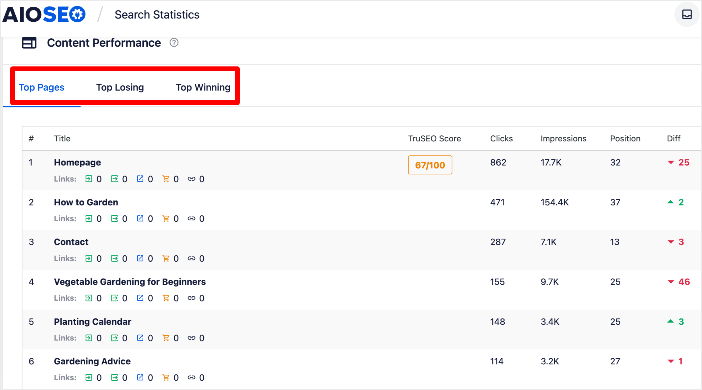
Search Statistics also does a fantastic job of helping you track and monitor keyword performance.
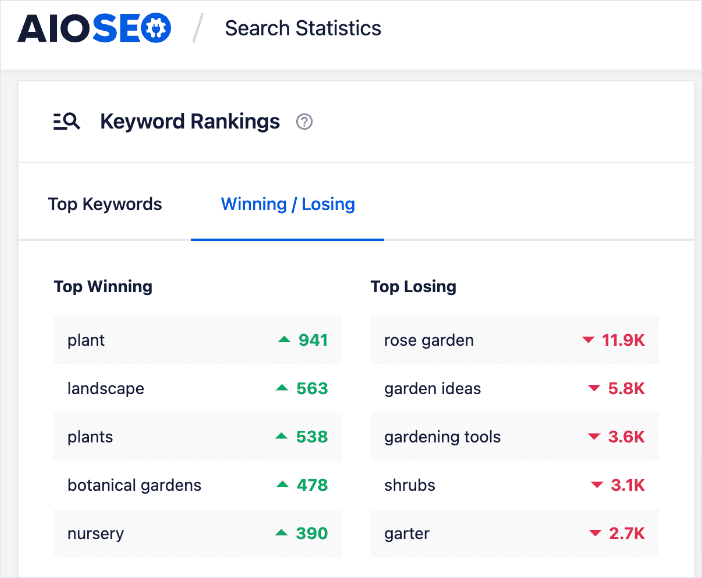
This data gives you a clear picture of where you stand concerning your competitors on SERPs. As a result, you can better develop goal-oriented SEO campaigns and strategies.
2. Identify Losing Keywords and Boost their Rankings
Another important step in conducting a SERP analysis is to check how you’re performing for your important keywords. You can use AIOSEO’s Keyword Performance report to see the ones you’re ranking for and those you are not. Next, compile a list of those you’re not targeting and develop a strategy to help boost their rankings. This will include:
- Identifying search intent for your keywords
- Updating your content to meet search intent
- Build internal Links
Check out this in-depth guide for more tips on using Search Statistics to boost your rankings.
3. Analyze Content Ranking for SERP Features
Part of SERP analysis involves analyzing content that’s ranking for SERP features like featured snippets. Ranking for these prominent spots on SERPs boosts your visibility and increases your clickthrough rates (CTR).
You can find the content ranking for featured snippets by plugging your keyword into a search engine like Google and manually checking for the featured snippet. Alternatively, you can use Ahrefs and check the SERP snippet. Next, open the link and study the article. Look for elements that make it different from your article and other articles not ranking for the featured snippet.
For more information on outranking your competitors on SERPs, check out this article for tips on checking and “stealing” your competitor’s keywords.
4. Spot Ranking Opportunities
Another way you can use SERP analysis to boost your rankings is by using it to spot ranking opportunities you may be missing. For example, suppose the top-ranking articles for your target keyword are listicles, and yours is a tutorial. In that case, you should rethink your content around that keyword and lean towards creating a list-based article.
You can also spot ranking opportunities by looking for content gaps on SERPs. This involves checking the top content on SERPs and identifying topics that still need to be covered. For this to work in boosting your rankings, make sure the content gaps you fill meet search intent.
Besides spotting content gaps, you should also look for outdated content that’s ranking high and recreate it. Because search engines love fresh content, your chances of ranking high are quite good. You can also consider building backlinks to your article by contacting the brands that linked to the old article and offering them your updated content.
5. Identify Ways to Update and Optimize Published Content
If you have content that’s not ranking well, you should consider updating and optimizing it. SERP analysis can help you figure out what you need to improve. A few things to consider as you analyze content ranking high on SERPs include:
- Metadata like URLs, meta descriptions, and the SEO title
- Content structure
- The common search intent type displayed
- Number of backlinks
- LSI keywords and synonyms to add
Other ways to update your content include adding a table of contents or FAQ schema. These will help make your content and search snippets more interactive and engaging. You can also read our tutorial on conducting a competitor analysis to help you maximize the chances of outranking your competitors.
6. Use Average CTR to Identify Content Users Love
Average CTR (Avg. CTR) is the number of clicks your search listing receives divided by impressions. It’s a vital piece of SEO data you can use to boost your rankings.
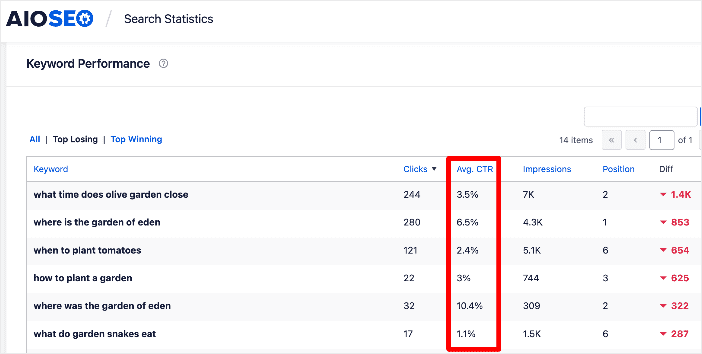
Identify content that gets high CTRs and investigate the factors that help it perform well. Study elements like:
- URL structure
- Search intent
- Metadata
- Topics the content covers
By identifying the factors that lead to high CTRs, you can create more content that gets more clicks. As a result, your content will enjoy a boost in rankings because search engines will deem your content more relevant to users.
What is SERP Analysis? Your FAQs Answered
What is SERP analysis?
SERP analysis stands for Search Engine Results Page analysis. It involves analyzing the search engine results page to understand how specific keywords or queries are performing in terms of ranking, features, and competition.
What tools can I use for SERP analysis?
The best SERP analysis tool for WordPress users is All In One SEO (AIOSEO). It has a Google Search Console integration that gives you tons of data right inside your WordPress dashboard. Other tools you can use include Google Search Console, Ahrefs, and Semrush, among others.
How can SERP analysis improve my SEO strategy?
SERP analysis can help you identify keyword opportunities, understand the types of content that rank well, and optimize your content to better match user intent. It also allows you to adjust your strategy based on changes in the search landscape and competitor activities.
Use SERP Analysis to Give Your Content a Competitive Edge
SERP analysis is an excellent way to understand how you and your competitors are performing in search engines. It’s also a great method of gathering information and data to help you better optimize your content for your target keywords.
We hope this post helped you learn what SERP analysis is and how it can help you to boost your rankings. You may also want to check out other articles on our blog, like our guide on using SEO data to boost your rankings or our tutorial on using our Chrome Extension to enhance your SEO.
If you found this article helpful, then please subscribe to our YouTube Channel. You’ll find many more helpful tutorials there. You can also follow us on Twitter, LinkedIn, or Facebook to stay in the loop.
Disclosure: Our content is reader-supported. This means if you click on some of our links, then we may earn a commission. We only recommend products that we believe will add value to our readers.
